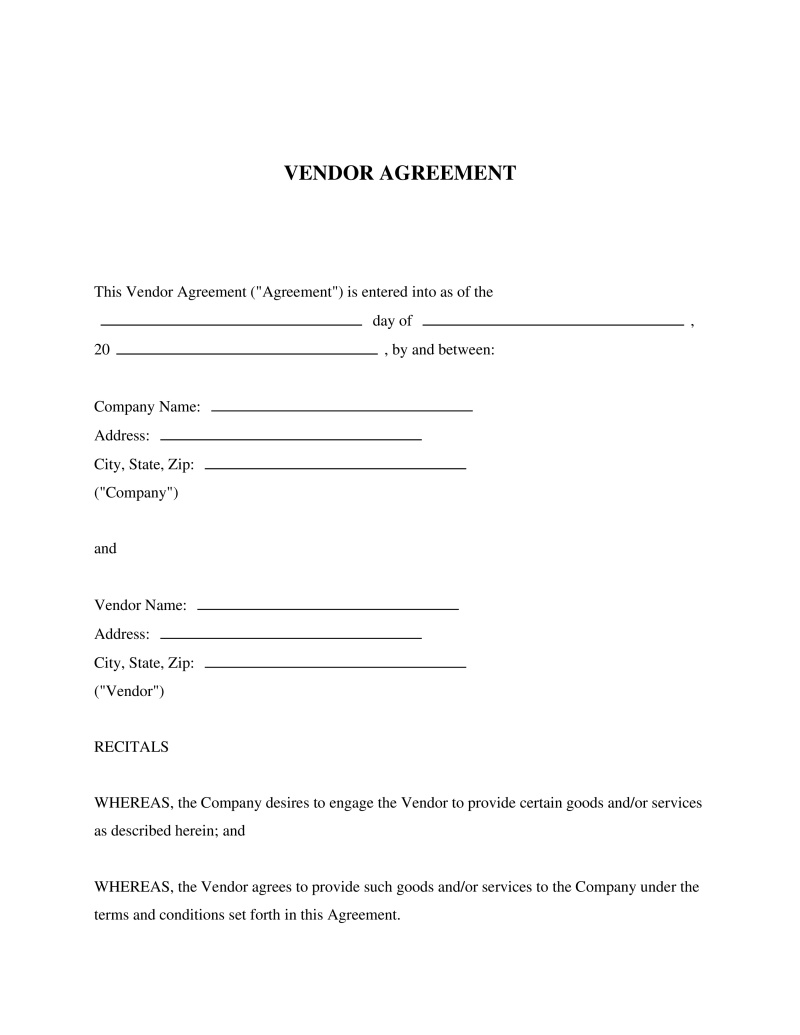A Vendor Agreement is a legal contract outlining terms between a vendor and client, detailing services, payment, and obligations.
Vendor Name
Provide the full legal name of the vendor as it appears on official documents, such as a business license or tax registration. Avoid using abbreviations or nicknames to ensure accuracy. This name is important for legal purposes and ensures that contracts and agreements are enforceable.

Table of Contents
What is a Vendor Agreement?
A Vendor Agreement is a legal contract between a business and a vendor, detailing the goods or services to be provided, the terms of delivery, pricing, and quality standards. This document serves as a binding guide that ensures both parties understand their responsibilities and the consequences of non-compliance. Businesses of all sizes need it to manage their relationships with vendors effectively, minimize risks, and ensure a steady supply chain. It not only formalizes the business arrangement but also offers legal protection in case disputes arise over the course of the agreement.
Key Features
Important Provisions
- Definition of Services: A detailed description of the goods or services being purchased, including quality standards and delivery timelines.
- Payment Terms: Conditions under which payments will be made, including amounts, deadlines, and penalties for late payments.
- Confidentiality Clause: Stipulations regarding the handling of confidential information to protect both parties' proprietary interests.
- Termination Clause: Provisions outlining how either party can terminate the agreement prematurely and any associated penalties or conditions.
Pros and Cons
Pros
- +Streamlines vendor management by clearly outlining expectations and responsibilities.
- +Reduces legal risks through comprehensive contractual protections and dispute resolution strategies.
- +Enhances operational efficiency by establishing clear guidelines for service delivery and performance metrics.
- +Improves budgeting accuracy with specified payment schedules and terms.
- +Facilitates strong vendor relationships by setting clear communication channels and expectations.
Cons
- -May require negotiations that can be time-consuming to reach an agreement acceptable to both parties.
- -Could potentially limit flexibility due to predefined terms on product specifications, delivery schedules, or prices.
- -Legal complexities might necessitate professional review to ensure comprehensiveness and compliance with applicable laws.
Common Uses
- Procuring raw materials or components essential for manufacturing processes.
- Engaging specialized service providers for tasks such as marketing, maintenance, or IT support.
- Outsourcing production elements to third-party manufacturers.
- Acquiring inventory from wholesalers or distributors for retail businesses.
- Entering into partnerships for the provision of utility services like electricity, water, or internet.
Frequently Asked Questions
Do you have a question about a Vendor Agreement?
Example questions:
Not the form you're looking for?
Try our legal document generator to create a custom document
Community Discussion
Share your experience and help others
Legal Notice: Comments are personal opinions and do not constitute legal advice. Always consult a qualified attorney for matters specific to your situation.
Comments (0)
Leave a Comment
No comments yet. Be the first to comment!